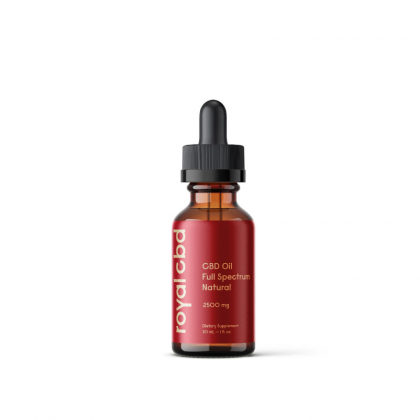| Total CBD: | 500 – 2500 mg |
| Potency: | 16.6 - 83.3 mg/mL |
| Cost per mg CBD: | $0.12 – $0.18 |
| Extract Type: | Full-spectrum |
| THC Content: | <0.3% |

Evidence based
CBD Oil For Weight Loss: How Does It Help? Benefits & Dosage
Roughly 2 out of every 3 people are either overweight or obese.
CBD acts on chemical messengers that indirectly control our weight.
It helps support blood sugar balance, beta-oxidation, cortisol, and mitochondrial function.
According to the National Health and Nutrition Examination Survey (NHANES), 2 out of every 3 people in America are overweight.
CBD oil has recently come to the surface as a promising weight loss supplement.
Can this controversial oil really offer the weight-loss advantages promised? Our verdict: yes, but not directly — CBD works through other systems in the body to return to an optimal state of health, which includes our body weight.
Here, we explore CBD and how it can be used to boost your weight loss program along with other diet and lifestyle changes.
Best CBD Oil For Weight Loss
- Royal CBD Oil — Best CBD Oil For Weight Loss Overall
- Gold Bee CBD Oil — Best Organic CBD Oil
- Hemp Bombs CBD Oil — Best THC-Free CBD Oil For Weight Loss
The Benefits of CBD For Weight Loss
The best way to lose weight, by far, is a regimented diet and exercise routine. Everything else is supplementary to this — including CBD.
With that said, adding CBD to your weight loss routine can go a long way in helping you shed extra weight more efficiently.
The benefits of CBD for weight loss include:
- Reduces appetite to curb eating habits
- Alleviates chronic inflammation associated with obesity
- Supports optimal hormone function
- Alleviates digestive disorders and inflammation
- Supports mitochondria function (where sugar and fat is burned for energy)
- May reduce insulin resistance
- Alleviates stress & anxiety
1. CBD Supports Mitochondria & Metabolic Health
You may remember from 8th-grade biology class that the mitochondria are the powerhouse of the cell.
It’s the part of the cell that’s responsible for converting sugars, fats, and even proteins into energy that the cell can use.
How Lazy Mitochondria Can Make Us Fat
When our mitochondria aren’t functioning optimally, which can happen for a variety of different reasons, it becomes harder to provide the body with the energy it needs and even harder to shed any extra weight.
What’s happening here is that the body is taking in lots of energy from our food, but our cells are having a hard time turning that energy into a currency we can actually use.
In order to prevent too much sugar and fat from building up in our bloodstream, the liver converts most of it into fat and puts it away in storage so we can use it at a later date.
The mitochondria are a key part of the metabolic system but they are far too small to fit in it on their own. This is where the endocannabinoid system comes in.
The ECS exerts its effects inside the cell, regulating the activity level of the mitochondria.
When they’re not working hard enough, the ECS whips them into shape. When they’re working too hard, producing more energy than we need, the ECS tells them to take the day off and slow down production.
This keeps us in metabolic balance, otherwise known as homeostasis.
When we take CBD, we’re essentially boosting the ability of the endocannabinoid system to keep control over the mitochondria.
For obese people, this almost always means whipping the mitochondria back into shape, converting more fats and sugars into energy that we can then burn off.
When combined with adequate exercise and nutritional support, this can significantly reduce overall fat storage by increasing the rate at which we burn through it.
Recent studies have shown that CBD plays a key modulating role in mitochondrial function [2, 3]. It does this indirectly through its role in regulating the endocannabinoid system as a whole.

2. CBD Normalizes Insulin Levels to Promote Fat Burning
Whenever we eat a meal, the nutrients from that meal are absorbed through the gut and into the bloodstream.
When these meals consist of energy-dense foods, like high-sugar and high-fat meals, the body gets a surge of energy in the bloodstream.
If we’re burning a ton of energy as well, through exercise and normal metabolism, then this isn’t a problem.
Energy in = energy out.
However, with obese people, there is a problem: they take a lot of energy in, but don’t put a lot of energy out. This allows things like sugar and fats to build up in the bloodstream, which is very dangerous.
High blood fats and sugars are closely linked with serious medical conditions like heart disease, diabetes, fatty liver disease, and even Alzheimer’s disease.
In order to keep the body safe, the liver steps up to convert most of the excess sugar into fat, which is then stored all around the body.
By storing this excess energy as fat, it doesn’t pose as much harm to the body.
The only way to stop this problem is by taking in less energy and burning more (less energy in and more energy out).
This is where diet and lifestyle changes come in. This is still the absolute best way to shed weight and keep it off.
However, when our body gets into a routine for too long, it’s very difficult to get out of it.
A lot of people, even after changing their diet and adding more exercise into their daily routine, find that they flatline with their weight loss. They lose a bunch of weight in the beginning, but shedding those last few pounds seems nearly impossible.
The problem lies with insulin levels.
How High Insulin Prevents Weight Loss
Insulin is a hormone released from the pancreas to shuttle sugar into the cells, where it’s then converted to energy.
Over many years of eating high sugar foods, insulin levels gradually rise – we call this hyperinsulinemia.
Even when we change our diet and lifestyle, insulin levels can remain high.
The important thing to note here is that whenever insulin levels are high in the bloodstream, we can’t burn fat.
This happens because insulin increases the uptake of fatty acids, favors the synthesis of lipids, and stops the breakage of fat. Altogether, these lead to energy storage,
And here is where CBD comes in.
CBD & Insulin
In a large study involving nearly 4700 patients with metabolic disease, CBD and marijuana use were shown to offer a 17% reduction in fasting insulin [4].
This is significant because if we can lower insulin levels, it becomes much easier to shed those last remaining pounds.
These effects are also extremely valuable for those with obesity, as it helps to stabilize insulin levels, and starts the process of curbing weight back down to healthy levels.
This is perhaps the most beneficial activity provided by CBD oil for obesity in the long run.
It’s important to note here that, although CBD is considered the main cannabinoid for producing these effects, it works better in a full-plant extract than in CBD isolates.
We always recommend going with a high-quality full-spectrum hemp extract for supporting insulin levels and cutting weight.
3. CBD Curbs Appetite to Decrease Calorie Intake
One of the main factors leading to obesity is our appetite.
Our body’s evolved for an environment where food was hard to come by, so we needed to make sure we stored enough of it to get through periods of time where food wasn’t available.
In the modern world, this has started to work against us.
Our appetites remain high, but food is always readily available. This allows us to eat our way to obesity far too easily.
Therefore, one of the best ways to cut weight and bring ourselves closer to a healthy range is by curbing our appetite as much as we can.
CBD is an excellent tool for achieving this.
You may be thinking:
“But marijuana makes us hungry, it gives us the munchies.”
This is true, but this is due to THC, not CBD.
Using psychoactive marijuana does stimulate the appetite, however, the CBD oil that contains only minuscule amounts of this particular cannabinoid actually has the opposite effect.
THC is considered an appetite stimulant, while CBD is considered an appetite suppressant.
It works by improving the sensitivity of the hypothalamus, the region of the brain responsible for controlling most of our homeostasis, including hunger levels.
When shopping for CBD oils to promote weight loss, make sure you buy something that includes mainly CBD, and only small amounts of THC to avoid causing the opposite effect and increasing hunger levels.
What is the Endocannabinoid System? What’s It’s Role in Weight Loss or Gain?
The endocannabinoid system (ECS for short) is a set of specialized, fatty-acid-based hormones/neurotransmitters that help regulate communication between a variety of different parts of the nervous system.
It’s used to regulate many different tissues in the body, including the neurological, metabolic, and immune systems.
Only in recent years have scientists started to uncover the many roles this system plays in the body, and how the cannabinoids from the marijuana and hemp plants are able to leverage this system to our advantage.

What is CBD?
CBD (cannabidiol) is just one of about 80 different cannabinoids. These are a group of chemicals found almost exclusively in the cannabis family of plants (Cannabaceae).
In order to classify as a cannabinoid, the compound needs to interact in some way with our endocannabinoid system.
In the cannabis plant, there are two cannabinoids that make up the majority of the plant constituent: CBD and THC (tetrahydrocannabinol).
Other cannabinoids include:
- Cannabichromene (CBC)
- Cannabigerol (CBG)
- Cannabinol (CBN)
- Cannabigerovarin(CBGV)
- Cannabidivarin (CBDV)
- Tetrahydrocannabivarin (THCV)
All cannabinoids have slightly different effects, but all will interact in some way with the endocannabinoid system.
When it comes to weight loss, the most important one to consider is CBD.
Cannabidiol is the predominant cannabinoid in cannabis oils made from hemp, but also makes up a large portion of marijuana oils that may or may not contain the psychoactive component, THC (tetrahydrocannabinol).
CBD impacts weight loss in 3 main ways:
- Supports our mitochondria & metabolic health
- Normalizes insulin levels to promote fat burning
- Lowers appetite to decrease calorie intake
We’ll get into the details of how each one of these works below.
Why Full-Spectrum CBD Is Better For Weight Loss
CBD is an excellent tool to address issues with obesity and promote weight loss in overweight people, but it can’t do it alone.
There are well over 200 different chemicals in the cannabis plant, and all of them are important.
Although CBD offers most of the benefits and is proven to provide weight loss support on its own, the other chemicals contained in the plant make it even more effective.
Some, like the terpenes in the essential oil of the plant, help CBD get absorbed by the intestinal tract, pass the blood-brain barrier, or slow the breakdown of CBD by the liver.
We call this the entourage effect because both CBD and THC are much stronger when they have their entourage of other terpenes, flavonoids, and cannabinoids along with them.
This is why we always prefer to use a full-spectrum extract for weight loss.
You can find CBD isolates which promise higher concentrations of CBD than their full-spectrum counterparts, but these don’t work nearly as well as an extract with the entourage included.

How to Use CBD for Weight Loss
Now that we’ve gone over how CBD helps with weight loss, let’s talk about how it can be used effectively.
As mentioned, make sure to go with a full spectrum hemp extract, rather than a CBD isolate or something that contains high amounts of THC.
Once you’ve found a good CBD oil, it’s time to figure out the right dose.
We recently made a guide to dosing CBD oil to help you figure out the right dose to start with.
Weight loss doesn’t happen overnight, no matter what those late-night infomercials promise.
The trick to successful weight loss is to look at it as a long-term lifestyle change. Don’t expect to lose 20 pounds by next week, or even the week after. Take it slow, and make the changes permanent.
Changing your diet to something with less refined carbohydrates and processed foods, and more vegetables will go a long way in shedding those extra pounds.
Additionally, adding as little as 30 minutes of mild-moderate exercise each day will help you burn unused energy, and get the fat burning.
CBD oil should be taken every day to start conditioning the appetite and mitochondria back to healthy levels. Most users report about 2 weeks of regular use before they start to really see and feel the benefits of the CBD oil on their obesity.
References
- Vemuri, V. K., Janero, D. R., & Makriyannis, A. (2008). Pharmacotherapeutic targeting of the endocannabinoid signaling system: drugs for obesity and the metabolic syndrome. Physiology & behavior, 93(4-5), 671-686.
- Ryan, D., Drysdale, A. J., Lafourcade, C., Pertwee, R. G., & Platt, B. (2009). Cannabidiol targets mitochondria to regulate intracellular Ca2+ levels. Journal of Neuroscience, 29(7), 2053-2063.
- Tedesco, L., Valerio, A., Dossena, M., Cardile, A., Ragni, M., Pagano, C., … & Nisoli, E. (2010). Cannabinoid receptor stimulation impairs mitochondrial biogenesis in mouse white adipose tissue, muscle, and liver: the role of eNOS, p38 MAPK, and AMPK pathways. Diabetes.
- Penner, E. A., Buettner, H., & Mittleman, M. A. (2013). The impact of marijuana use on glucose, insulin, and insulin resistance among US adults. The American journal of medicine, 126(7), 583-589.
- Morgan, C. J., Freeman, T. P., Schafer, G. L., & Curran, H. V. (2010). Cannabidiol attenuates the appetitive effects of Δ 9-tetrahydrocannabinol in humans smoking their chosen cannabis. Neuropsychopharmacology, 35(9), 1879.
More Health Benefits to Explore
-
Conditions Related to Health Benefits
- CBD For Allergies: Can This Cannabinoid Ease Symptoms?
- Top 10 CBD Oils For Back Pain
- Can CBD Help With Menstrual Cramps?
- CBD for Sciatica: How It Works, Safety, Drug Interactions, & Best Products
- Is CBD a Viable Treatment for Cerebral Palsy?
- CBD Oil For Sleep
- CBD For Psoriasis: Can CBD Help to Alleviate Symptoms?
- Traumatic Brain Injury (TBI)
- Arthritis
- Anxiety & Depression
- Weight Loss
- ADD & ADHD
- Anorexia
- Alzheimer’s Disease & Dementia
- Addiction
- ALS (Amyotrophic Lateral Sclerosis)
- Antibiotic Resistance
- Asthma
- Atherosclerosis
- Autism
- Acne
- Bipolar Disorder
- Pain
- Crohn's Disease & Ulcerative Colitis
- Diabetes
- Epilepsy
- Endocrine Disorders
- Fibromyalgia
- Fatty Liver Disease
- Glaucoma
- Hypertension
- Heart Disease
- Huntington's Disease
- Inflammation
- Irritable Bowel Syndrome (IBS)
- Kidney Disease
- Migraine Headaches
- Muscle Recovery
- Multiple Sclerosis
- Motion Sickness
- Metabolic Syndrome
- Neurodegeneration
- Cancer
- Nausea
- Neuropathic (Nerve) Pain
- Osteoporosis/Bone Health
- Obsessive-Compulsive Disorder (OCD)
- Polycystic Ovarian Syndrome (PCOS)
- PTSD
- Prion/Mad Cow Disease
- Premenstrual Syndrome (PMS)
- Parkinson’s Disease
- Schizophrenia
- Sickle Cell Anemia
- Stroke
-
Conditions Related to Products
- Ranking The Top 13 THC Gummies By Category (Δ8, Δ9, Δ10, HHC, & More)
- Top 10 CBD Oils For Back Pain
- Everything You Need to Know About CBD Sunscreen
- Top 7 CBD Gummies For Sleep & Insomnia
- Top 7 CBD Gummies To Help With Anxiety (2022)
- Best CBD Gummies For Pain (Top-Rated Pain Gummies For 2022)
- Best Hemp Cigarettes (Top 5 Nicotine-Free Smokes)
- Top 5 CBD Lip Balms For 2022
- The Top 7 CBD Face Masks for 2022
- The Best CBD Inhalers For 2022 (& How to Use Them)
- Best Full-Spectrum CBD Vape Juice: What to Look For & How to Use It
- CBD Eye Drops: New Option For Glaucoma?
- CBD Oil For Dogs With Arthritis
- Best CBD Massage Oils In 2022
- Buyer's Guide To The Best CBD Vape Kits In 2022
- CBD Chocolate: Yes, It Exists & It's Just as Divine as it Sounds
- CBD Pre-Rolls & Cigarettes
- Terpene Concentrates
- Best CBD Soaps
- Best CBD Shampoo & Conditioner
- Best CBD Juul Pods
- CBD Isolate Oils
- Full-Spectrum CBD Oils
- Best CBD Lube
- CBD Honey
- CBD Transdermal Patches
- Best Dry Herb Vaporizers
- CBD Oil For Dogs With Epilepsy
- CBD Oil For Dogs With Anxiety
- CBD Oil For Dogs With Cancer
- CBD For Horses
- CBD Chewing Gum
- CBD Pain Cream
- CBD Oil For Cats
- CBD Oil For Dogs
- CBD Hemp Flower
- CBD Suppositories
- Best CBD Gummies for Pain, Sleep & Anxiety Reviewed (2022)
- CBD Teas
- CBD Vape Pens
- CBD Vape Oils
- CBD Coffee
- CBD Drinks & Shots
- CBD Crystals
- CBD Skincare
- Best CBD Oil & Gummies For Kids: Is CBD Safe for Children with Anxiety & ADHD?
- CBD Concentrates
- CBD Bath Bombs
- CBD Capsules
- CBD Sprays
- CBD Dog Treats
-
Conditions Related to Topicals
-
Conditions Related to Oils & Tinctures
-
Conditions Related to Edibles
- Top 7 CBD Gummies To Help With Anxiety (2022)
- Best CBD Gummies For Pain (Top-Rated Pain Gummies For 2022)
- CBD Chocolate: Yes, It Exists & It's Just as Divine as it Sounds
- CBD Honey
- CBD Chewing Gum
- Best CBD Gummies for Pain, Sleep & Anxiety Reviewed (2022)
- CBD Teas
- CBD Coffee
- CBD Drinks & Shots
- CBD Capsules
-
Conditions Related to Gummies
- Ranking The Top 13 THC Gummies By Category (Δ8, Δ9, Δ10, HHC, & More)
- Top 7 CBD Gummies For Sleep & Insomnia
- Top 7 CBD Gummies To Help With Anxiety (2022)
- Best CBD Gummies For Pain (Top-Rated Pain Gummies For 2022)
- Best CBD Gummies for Pain, Sleep & Anxiety Reviewed (2022)
- Best CBD Oil & Gummies For Kids: Is CBD Safe for Children with Anxiety & ADHD?
-
Conditions Related to Hemp Flower
-
-
Conditions Related to Terpenes
-
-
Conditions Related to Cultivation
-
Conditions Related to Concentrates
-
Conditions Related to Delta 8 THC
-
Conditions Related to Delta 9 THC
-
-
-
-
Conditions Related to CBD
- Everything You Need to Know About CBD Sunscreen
- Top 7 CBD Gummies For Sleep & Insomnia
- Top 7 CBD Gummies To Help With Anxiety (2022)
- Best CBD Gummies For Pain (Top-Rated Pain Gummies For 2022)
- Best Hemp Cigarettes (Top 5 Nicotine-Free Smokes)
- Top 5 CBD Lip Balms For 2022
- The Top 7 CBD Face Masks for 2022
- The Best CBD Inhalers For 2022 (& How to Use Them)
- Best Full-Spectrum CBD Vape Juice: What to Look For & How to Use It
- CBD Eye Drops: New Option For Glaucoma?
- CBD Oil For Dogs With Arthritis
- Best CBD Massage Oils In 2022
- Buyer's Guide To The Best CBD Vape Kits In 2022
- CBD Chocolate: Yes, It Exists & It's Just as Divine as it Sounds
- CBD Pre-Rolls & Cigarettes
- Best CBD Soaps
- Best CBD Shampoo & Conditioner
- Best CBD Juul Pods
- CBD Isolate Oils
- Full-Spectrum CBD Oils
- Best CBD Lube
- CBD Honey
- CBD Transdermal Patches
- CBD Oil For Dogs With Epilepsy
- CBD Oil For Dogs With Anxiety
- CBD Oil For Dogs With Cancer
- CBD For Horses
- CBD Chewing Gum
- CBD Pain Cream
- CBD Oil For Cats
- CBD Oil For Dogs
- CBD Hemp Flower
- CBD Suppositories
- Best CBD Gummies for Pain, Sleep & Anxiety Reviewed (2022)
- CBD Teas
- CBD Vape Pens
- CBD Vape Oils
- CBD Coffee
- CBD Drinks & Shots
- CBD Crystals
- CBD Skincare
- Best CBD Oil & Gummies For Kids: Is CBD Safe for Children with Anxiety & ADHD?
- CBD Concentrates
- CBD Bath Bombs
- CBD Capsules
- CBD Sprays
- CBD Dog Treats
-
-
Conditions Related to THC-O
-
-
Conditions Related to Joint Health
-
Conditions Related to Pain Disorders
- Top 10 CBD Oils For Back Pain
- Can CBD Help With Menstrual Cramps?
- CBD for Sciatica: How It Works, Safety, Drug Interactions, & Best Products
- Traumatic Brain Injury (TBI)
- Arthritis
- Pain
- Fibromyalgia
- Glaucoma
- Inflammation
- Kidney Disease
- Migraine Headaches
- Multiple Sclerosis
- Neuropathic (Nerve) Pain
- Premenstrual Syndrome (PMS)
- Sickle Cell Anemia
-
Conditions Related to Autoimmune Disease
-
Conditions Related to Cognitive Health
-
Conditions Related to Metabolic Disorders
-
Conditions Related to Psychological Disorders
-
Conditions Related to Muscles & Bones
-
Conditions Related to Nervous System
- CBD for Sciatica: How It Works, Safety, Drug Interactions, & Best Products
- Is CBD a Viable Treatment for Cerebral Palsy?
- CBD Oil For Sleep
- Traumatic Brain Injury (TBI)
- Anxiety & Depression
- ADD & ADHD
- Anorexia
- Alzheimer’s Disease & Dementia
- Addiction
- ALS (Amyotrophic Lateral Sclerosis)
- Autism
- Bipolar Disorder
- Epilepsy
- Huntington's Disease
- Inflammation
- Migraine Headaches
- Multiple Sclerosis
- Motion Sickness
- Neurodegeneration
- Neuropathic (Nerve) Pain
- Obsessive-Compulsive Disorder (OCD)
- PTSD
- Prion/Mad Cow Disease
- Parkinson’s Disease
- Schizophrenia
-
-
Conditions Related to Reproductive Health
-
Conditions Related to Hormones & Endocrine
-
Conditions Related to Skin Health
-
Conditions Related to Cardiovascular System
-
Conditions Related to Digestive System
-
Conditions Related to Genetic Disorders
-
Conditions Related to For Children










